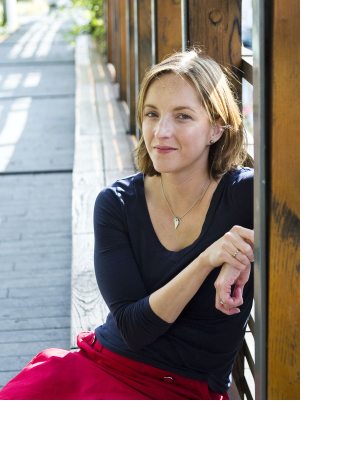
Rebecca Makkai, Chicago-based author of the novel The Great Believers, was recently interviewed by Northbrook Public Library Fiction & Media librarian, Mike Hominick.
Having led Northbrook Writes workshops in the past and as the current Artistic Director of StoryStudio Chicago, what do you most enjoy about supporting fellow writers?
Honestly, it’s just fun. And I learn so much from seeing other writers work, and talking to them about process. In any other art form, you can watch your peers work. If you were a dancer, you would see other dancers learning and progressing; if you were an artist, you could watch someone else paint. It’s really hard to watch another writer write, though. You can’t stand there over their shoulder, so working with students or reading friends’ drafts are really the only ways you can see someone else’s process. Of course I also love seeing students’ success. Recently, a student of mine from StoryStudio finally found an agent for her brilliant novel after a long search, and I was just glowing all day.
What words of encouragement do you have for aspiring writers?
You need to make sure you’re working on something wildly fun. That doesn’t necessarily mean funny or silly, but something you yourself find compellingly entertaining. The world’s feedback might not be sustaining you yet, and your own confidence might not be sustaining you yet, but the story itself can keep you going. And if you’re having a blast, your readers likely will, too.
Your first novel, The Borrower, is almost a love letter to books and libraries. How have libraries influenced you?
I grew up going to the Lake Bluff Library, checking out armloads of books, but also participating in the writing contests they sponsored. I won a few times, and I can’t overestimate the impact of that. I’m not entirely sure I would be a writer without that first early encouragement.
Your latest novel, The Great Believers, which moves between Chicago and Paris and follows a group of friends who are devastated by the AIDS crisis in 1985 has received rave reviews from critics, patrons, and librarians. What inspired you to write this novel?
I set out to write a novel about a woman who’d been an artists’ model in 1920s Paris, but stuff happened. (If you read the book, this will actually make sense; the story started with Nora.) I’ve been drawn for a long time to write about chosen family (it’s a big theme of my second novel, The Hundred-Year House, as well), which is one of many, many reasons I was drawn to write about the people most affected by the American AIDS epidemic.
The Great Believers would make for such a great book discussion. Have there been any reactions to it that surprised you or that you especially liked?
It hasn’t been surprising, but I’ve loved hearing people share their own stories about HIV/AIDS. There are people with intense personal histories—survivors, of course, but also those who worked in health care, or people who worked in the arts and lost an enormous number of friends. But I’m interested, too, in the stories of those who were around then but weren’t really tuned in to what was going on, the people who say “I was living in the suburbs raising my kids, and I just had no idea what it was really like.”
That’s an important conversation to have—why they didn’t feel connected to this crisis, and whether they’ve come around to an understanding of what was happening. I love hearing that my book has reached those people. It’s about thirty years too late, in one sense, but in another sense it’s not; marginalized people are always going to be the ones affected by governmental and societal indifference, and something like this is absolutely going to happen again.
That was a really dark answer, so I’ll give a lighter one, too: I love hearing people discuss the book’s minor characters, ones who are dear to me even though they get so little time on the page. I’ve heard a lot about Dr. Cheng, Julian’s mother, and Roscoe the cat.





